Archived Fire Damage Blog Posts
Fire Damage Remediation FAQ's
5/17/2023 (Permalink)
When it comes to fire damage, we get a lot of questions. So, we asked our project managers to answer some of the most commonly asked fire damage remediation queries.
Here is what they said:
Can my clothes/photos/artwork be cleaned after a fire?
Yes. There is a network of different specialty companies that we can coordinate with to quickly remove these items from the source and clean/restore to their original state if no permanent damage has occurred.
Can I use water to clean soot off my walls?
No. A product with degreaser is needed to clean soot, but be warned, there are different types of fire which can require different methods of cleaning. When in doubt, give us a call!
Is it possible to get rid of the odor after a fire?
Yes. Each fire is unique in the scope of work that is required to remove the odor, however. Some are as simple as light cleaning and deodorizing, and others may require demo of heavy areas and encapsulating the framing before new materials to remove the odor.
What should I do after a fire but before SERVPRO comes?
- Take lots of photos from different angles.
- Determine what items you need in case you can't live in the home.
- Order refills of all medications located in a room with visible soot damage. Bottles may not be airtight & it's advised nothing exposed to soot be ingested.
- Call your insurance company.
How does SERVPRO clean fire damage?
We have access to a complete line of SERVPRO cleaning products that are tailored for any situation that we may encounter. The type of fire, material or fabric will determine which product we will need to complete the job.
Still have questions? Need our help getting your home or business back to normal after a fire? Give us a call! We are happy to help!
Spring Cleaning? Don’t Forget Your Dryer!
4/29/2022 (Permalink)
Although it’s a big job, spring cleaning is so rewarding! There’s nothing quite like a new season and a fresh start in your space.
However, at SERVPRO we always like to remind our customers about the importance of safety when it comes to spring cleaning. Part of that involves bringing attention to often overlooked areas of your home that can pose a fire hazard, if not routinely cleaned properly.
Here are three easy tips from the National Fire Protection Association to ensure that your dryer is cleaned out completely and safe to operate:
- Check the exterior air exhaust pipe and make sure that the vent flap opens when the dryer is in use.
- Avoid storing flammable items, like cardboard boxes and chemicals, near the dryer.
- If your clothes encounter hazardous and flammable liquids like paint thinner, leave them outside to dry before washing and drying in your dryer.
These are simple strategies, but don’t underestimate their importance when it comes to keeping you, your family, and home safe from fires.
According to the U.S. Fire Administration, nearly 3,000 dryer fires are reported annually, resulting in approximately five fatalities, 100 injuries, and an estimated $35 million in property loss and damages.
In addition to following the three safety steps above, always clean the actual dryer -- including that lint trap! -- since 34% of dryer fires result from failure to clean the dryer.
Stay safe while you spring clean your home this season and keep in mind that SERVPRO of Danvers / Ipswich is never more than a phone call away!
Not All Kindling is Created Equal -- Avoid These Types of Wood!
3/29/2022 (Permalink)
There is nothing quite as cozy as a crackling fire on a raw, rainy day in early spring. Given that our SERVPRO team is always concerned about fire safety in your home, we want to update you on two types of wood you should never use to start or feed a fire.
The first -- brushwood -- might seem obvious because you wouldn’t want to pick it up or touch it, anyway. Brushwood includes plants like poison ivy, poison oak, and poison sumac.
You already know that contact with this kind of vegetation can result in an itchy rash on your skin. But did you know burning it can actually cause severe allergic respiratory reactions, that can put anyone gathered around to enjoy the warmth of the fire at risk.
Second -- any type of evergreen tree, like cedar, pine or spruce -- will ignite quickly and burn very hot. They actually ignite so quickly that they fizzle out almost as fast, potentially creating creosote deposits inside your chimney, which can cause a chimney fire.
In that event -- or the event of any type of fire -- call SERVPRO of Danvers / Ipswich for expert fire restoration services.
Beware of Increased House Fire Risk During Cold Winter Months
2/25/2022 (Permalink)
With dropping temperatures, snow, and ice come increased reliance on heating systems and even comfort cooking appliances, like crockpots. Thank goodness for these modern conveniences; however, the very equipment that keeps us comfortable on even the coldest days comes with the potential to cause a house fire.
Here, our SERVPRO MA team shares some common sense, but critical tips to cook your favorite foods safely this winter.
Cooking: #1 Culprit for House Fires
Did you know that cooking is the number one cause of house fires?
We would never discourage you from whipping up some crockpot-style comfort food; however, you’ll want to make sure that your crock pot is in good working order. And the same goes for all other appliances, including your kitchen’s stove. Check the wires and look for any faulty switches or buttons, along with loose oven doors or ill-fitting lids on slow cookers.
Of course, even in perfect condition and optimal working order, you want to take additional precautions like keeping your cooking equipment clear of flammable items like kitchen towels, printed recipes, etc.
Cleaning your stovetop and oven regularly will also help minimize the accumulation of any flammable food crumbs or grease.
If your favorite recipe somehow went up in flames, SERVPRO is standing by with fire restoration services to get your kitchen up and running again.
Seriously… Stop Playing with Fire
2/25/2022 (Permalink)
Didn’t your parents ever teach you not to play with fire? According to current research, some of you missed the message.
Residential or house fires are caused by many things; some are more frequent than others and therefore considered very common causes of house fires.
For instance, statistics from 2019 show that 50.2% of house fires were caused by cooking, with appliances causing nearly 3%, and for 1.3%, the cause remains under investigation, potentially the result of arson or intentional firesetting.
For the purposes of this post, we’re not addressing arson, which is a crime. No, when we urge people to stop playing with fire, we’re looking at the fact that 0.3% of residential fires result from “playing with heat source.”
Sure, that’s a small number, but still… Fires are costly, both to human lives and physical structures. There is no need to put first responders at unnecessary risk or jeopardize the safety of your home and household by playing Jack be Nimble and jumping over candlesticks.
Practice fire safety year-round to ensure that you’ll never have to call SERVPRO of Danvers / Ipswich for fire restoration services.
Should You Use Real Candles on Your Christmas Tree?
12/30/2021 (Permalink)
Decorating your home for the holidays is a fun family tradition, especially with a classic holiday film playing in the background, upstaged by the glow of the Christmas tree.
Speaking of glow… Have you heard about the traditional decorating trend rumored to make a comeback?
Unfortunately, this classic and beautiful look presents a potential fire hazard in the form of real candles on your Christmas tree. Yes, we’re talking about those candles that flicker with an actual flame.
In Favor of Fake (Candles)
As mesmerizing as the glow of a real flame can be, the fact is candles and trees (real or artificial) do not mix. An open flame is unpredictable; therefore, unsafe, particularly in the presence of children or pets.
At SERVPRO, we urge you to use LED lights for your decorating needs, rather than real candles, which can quickly require fire restoration, extinguishing your holiday festivities.
Have a lovely and safe holiday season from our team at SERVPRO Danvers / Ipswich. No matter the season, we are standing by and ready for you to contact us with any fire restoration questions or concerns.
Do We Deep Fry Everything Now?
11/23/2021 (Permalink)
Well, what is better than a fried turkey leg? Pretty much nothing as long as you know the proper procedures for using your deep fryer safely! Here at SERVPRO, we want you to cook how you want this holiday season, which means keeping fire safety in mind.
Gobble Gobble, Get to Know your Fryer!
Here is the 411 from the National Park Service on how to set your cooking situation up for success and prevent any fires and resulting fire damage.
- Keep that fryer flat! These fryers are known to wobble and spill, causing concern for oil to potentially ignite.
- Do not overfill! If you have to question it, perhaps don’t fill it that much. It is better to cook a few things separately than burn everything.
- Warning: hot surface! The lid and handles on your fryer are going to heat up. Give it ample time to cool down before serving. Trust that the turkey will not go cold!
- Back up plan! If it is raining or snowing, perhaps this is not the year to deep fry your turkey. Remember, grease fires can spread from water, so if rain reaches the contents of the fryer it could result in burning, scalding steam.
Damage From the Fryer Fire
Each year, there is more than $15 million in property damage requiring fire restoration and an average 60 injuries due to deep fryer fires. Don’t become a statistic! Stay aware of any warning signs and keep an extinguisher handy at all times!
If the turkey gets away from you this holiday season, SERVPRO Danvers / Ipswich is here to help! We would like to see your deep frying go off without a hitch, but if it does not, give us a call!
Chirping or Not, Check Your Fire Alarms!
10/21/2021 (Permalink)
Smoke detectors are commonly known as the ‘set them and forget them’ tool meant to keep you and your family safe from fire. Instantly, we go from appreciation to annoyance the second we hear the loud chirp letting us know it’s time to check the batteries on our fire detectors.
Consider this post a PSA from your local SERVPRO MA team.
When to Check Your Smoke Detectors
Sure, a chirp is a great signal that your smoke detector needs to be checked for something like new batteries, but what if it never chirps? This could mean nothing or it could mean that you have faulty or broken smoke detectors.
To avoid this worry, smoke detectors should be checked monthly. Just running a quick test will show that your batteries are working and your family is protected.
Keep in mind, the batteries in your smoke detector should be replaced every year. Even when they are not chirping, it is important to replace the batteries in order to keep the detectors operating as they should.
In fact, your entire smoke detector system should be replaced every 10 years. This is an inexpensive (usually between $6 and $24) way to keep your house -- and your family -- safe.
Contact us to chat about any chirps or to schedule any fire restoration service you might need.
Surprising Causes of Fire in Commercial Buildings
9/8/2021 (Permalink)
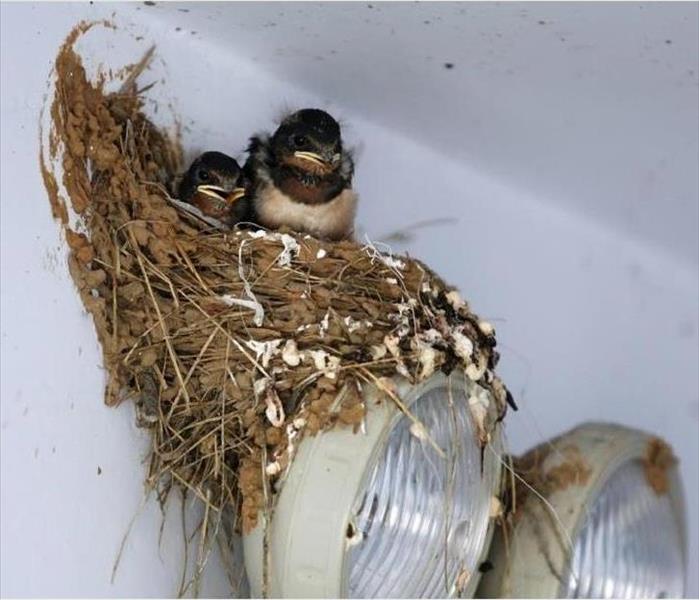 No matter how cute baby birds might be, it's safer for you and them to remove nests from above lights. Photo from Bird-B-Gone.
No matter how cute baby birds might be, it's safer for you and them to remove nests from above lights. Photo from Bird-B-Gone.
When you own or manage a commercial building, you’ve got a laundry list of responsibilities and tasks to take care of. The last thing you need to worry about is a fire, which is why you probably take fire prevention seriously. However, there are some causes of fire in commercial buildings that might surprise you and still require professional remediation by your local SERVPRO MA team.
While it might sound silly, there are two culprits you’ve probably never considered. One is up above your head and the other is, often, right under your nose.
Nests and Non-dairy Creamer
What do bird’s nests and non-dairy creamers have in common?
Very little, as it turns out, except for their potential to cause a fire in your commercial building. We’re not kidding. When birds decide to nest on or around light sources, there is a chance that the twigs and combustible materials they used to build their nests can actually ignite, if they get hot enough.
Add the following item to your list of commercial chores: inspect your exterior light fixtures for nests and remove them for added safety.
Now, you don’t have to nix the non-dairy creamer from your office kitchen and run the risk of angering your employees. However, you do want to ensure that all non-dairy creamers and other power-based materials are stored safely. These are not combustible materials, but they do send fine particles airbound if they are spilled. If those particles encounter static electricity, spark or open flame, they might ignite, causing a fire in your establishment.
In the event of a fire in your commercial space, contact your local SERVPRO of Danvers / Ipswich team for fire damage repair and restoration and commercial restoration you can count on.
How to Help a Neighbor After a Fire
8/30/2021 (Permalink)
Imagine this. You’re sitting at home relaxing after a long day of work when suddenly you hear the telltale sound that something serious has just happened- firetruck sirens. You get up and look outside to see the engines have stopped in front of your neighbor’s house. What do you do then? Run outside? Go back to what you were doing and ask them or another neighbor about it later? Or do you panic and wonder what you can do to help? Well, here are some quick and easy ways you can help a neighbor after a fire.
- Gather Essentials. If there’s a fire in your home, the last thing on your mind is going to be if you remembered to grab the toothpaste. Raid your stash of minis you took from hotels, and toothbrushes you get every time you go to the dentist and see what you can assemble. Items such as shampoo, conditioner, soap, toothbrushes, toothpaste, deodorant, even extra floss that you have lying around could help someone feel the slightest bit more normal after a fire.
- Bring them some food. A meal, groceries, even some extra nonperishables you have tucked in the cupboard. Anything helps. We know we all can’t be Gordon Ramsay level chefs, so a nice home cooked meal may feel like less of a gift and more of a curse but it’s the thought that counts. If you still aren’t comfortable, there’s always take-out, again, it’s the gesture that’s important.
- Start a fundraiser. It can be anything from going door-to-door asking other neighbors to pitch in supplies, to a GoFundMe to raise money to help offset some of their financial burden. Another great place to get community support, or even ideas on how to help, is through local Facebook groups.
- Check in. Even if you haven’t spoken in ages, a simple “Hey, I’m thinking of you” can go a long way. When you go through a catastrophic, life-changing event, knowing people are there and thinking of you truly makes a world of difference, trust us.
- Offer to listen (and mean it.) No one needs to hear about how your Great-Aunt Helen’s friend’s daughter’s boyfriend’s shed caught on fire 17 years ago, especially if they were just the victim of a fire themselves. Let them talk. Let them cry if they need to. Don’t try to fix everything. Just be there for them. At the end of the day, that’s what counts.
- Give them our number. We know what kind of damage a fire can cause, and our team of trained professionals know what it takes to properly cleanup and restore their home back to normal.
An Overview of Fire Damage Restoration Process
7/25/2021 (Permalink)
After a fire occurs, there’s nothing you’d like more than to go back to a time before the fire happened. We can’t go back in time to before you had a fire in your home and prevent it, but we like to say that we do all we can to make your home be “Like it never even happened.”
How? Our trained Massachusetts fire damage restoration experts at SERVPRO of Danvers / Ipswich have their number one goal as returning your fire damaged areas and items to their preloss condition.
We have a proven emergency fire damage process that works for us and will help you get your home back to its pre-fire damage state quickly and professionally. Here’s an overview:
- One hour from notice of loss. One of our trained fire damage restoration professionals will contact you to arrange for service.
- Four hours from notice of loss. One of our trained professionals will be on-site at your home to start fire damage mitigation services.
- A detailed explanation. You will receive a thorough briefing of the fire damage restoration process, step-by-step, explaining what you can expect and the planned outcome.
- Pre-testing. We will begin pre-testing your home’s surfaces, furnishings, and contents for restorability, working from the source of the fire damage (for example, the outlet if faulty wiring caused a fire) outwards.
- Eight hours from on-site arrival. You (or your insurance adjuster if you’re working with an insurance company on your fire damage claim) will receive a verbal briefing of the scope of work.
- Cleaning, restoration, and deodorization. We will work neatly and efficiently with state-of-the-art fire damage restoration techniques and equipment to ensure your home is taken care of correctly the first time.
- Final walk-through. After the fire damage restoration work has been completed, we will walk you through the work we’ve done to make sure it’s to your approval.
Contact us here at SERVPRO of Danvers / Ipswich for an assessment of your fire damage in Massachusetts along with a plan for remediation and rebuilding to bring your home back to its pre-fire damage state. We are dedicated to making it “Like it never even happened.”
Why the Right Fire Damage Equipment is so Important
6/15/2021 (Permalink)
When there’s a fire at your home, your first priority is the fire itself. Once the fire’s out and the fire trucks have left, it’s time to deal with the resulting fire damage. But did you know that you have a higher chance of saving your belongings (including precious documents, like pictures) and preserving your house if you choose the right fire damage restoration company that has the best fire damage equipment for the job?
Here’s why SERVPRO of Danvers / Ipswich should be your choice for your Massachusetts fire damage restoration.
Cleaning to Restore vs. Replace
First, we have a “restore” versus “replace” mentality that helps you save money when you need to clean your keepsakes that were damaged in the fire. Our cleaning equipment uses state-of-the-art methods, including:
- Dry Cleaning. Cleaning up light residues or to pre-clean prior to wet cleaning.
- Wet Cleaning. An effective cleaning method for removing moderate to heavy residues.
- Spray and Wipe. Effective for items that can’t withstand wet cleaning.
- Foam Cleaning. Used for upholstery fabrics that might shrink or bleed if wet cleaned.
- Abrasive Cleaning. Involves agitation of the surface being cleaned.
- Immersion Cleaning. Contents are dipped into a bath of the cleaning product.
Cleaning Electronics
Fire-damaged electronics are best left to professionals like SERVPRO of Danvers / Ipswich. We have the technology and equipment to remove smoke residue and the resulting acids on your fire-damaged electronics.
Drying Documents and Photographs
When your valuable documents, including photographs, are damaged by water or fire, extreme caution should be taken to help ensure the fire damage does not destroy the document. Although some documents may not be restored to pre-fire damage condition, SERVPRO of Danvers / Ipswich can save a great deal and help minimize additional damage. Learn more about our document restoration services.
Top Tips to Prevent House Fires
5/8/2021 (Permalink)
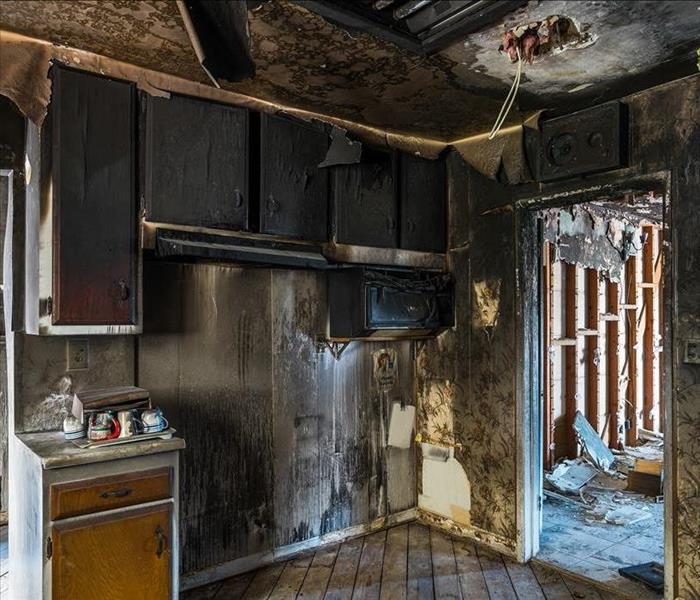 This kitchen fire spread quickly and damaged multiple floors of the home.
This kitchen fire spread quickly and damaged multiple floors of the home.
Fire Prevention Month may not be until October, but how to prevent a house fire is something you should be thinking of and know year-round instead of just one month.
- Test your smoke and fire detectors regularly. Yes, you should change their batteries (if they’re not hard-wired into your house) twice a year when Daylight Savings Time begins and ends. But your smoke alarms need to be tested more than that. In fact, the US Fire Administration (USFA) actually recommends testing smoke and fire alarms monthly.
- Stay in the kitchen while you’re cooking. This may seem like common sense, but it’s easy to get distracted by a phone call or quickly going to throw on a load of laundry. In that time, a grease fire could start.
- Don’t charge your phone on your bed. Instead, place it on a flat surface that provides room for any generated heat to release.
- Blow out candles. This should be done before you leave a room, leave your home, or go to sleep for the night to avoid fire damage from a lit candle.
- Clean your dryer. Specifically, clean out the lint trap after every cycle to prevent a dryer fire from lint build-up.
- Use space heaters safely. The National Fire Protection Association states that space heaters cause 43 percent of home heating-related fires.
- Look out for faulty wiring. If your lights are flickering, or a light switch feels warm or hot to the touch, turn off the power and call an electrician immediately.
If a fire does happen, there can be residual soot and smoke damage from the fire to your furnishings, clothes, and possessions that needs to be remediated. Contact the Massachusetts fire damage restoration experts at SERVPRO of Danvers / Ipswich for a fire damage assessment for remediation and rebuilding of your home.
Is Your Phone Charger a Fire Hazard?
4/12/2021 (Permalink)
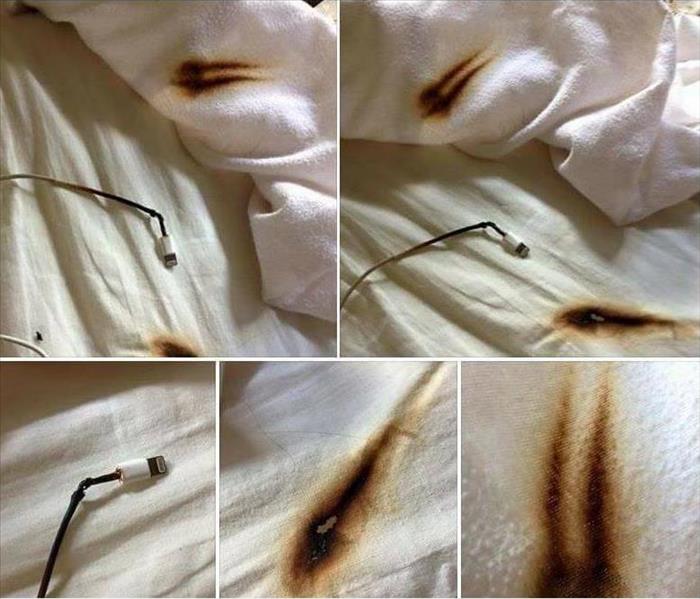 These photos went viral when Newton NH Fire Department shared them on Facebook back in 2017.
These photos went viral when Newton NH Fire Department shared them on Facebook back in 2017.
Your phone connects you to family, friends, and all the information in the world. These days, it’s a bit easier to do research for a school paper by googling for information on your phone instead of going to the library and searching through the card catalog for the right books. With all of the connection and information your phone provides, why wouldn’t you want it charged around the clock? The answer: to prevent a home fire.
Some people keep their phone right next to them on their bed, charging while they sleep so they’ll have a fully charged phone when they wake up. In fact, research found that 53% of children/teens charge their phone or tablet on their bed or under their pillow while they sleep.
If you or a loved one does this, stop doing so immediately to avoid a home fire caused by a phone charger. Phones need to be charged on a hard, flat surface that allows for room for the generated heat to release. If your phone is charging under the pillow, there’s only one place for the heat to go, and that’s onto the bed sheet or pillowcase, neither of which was made for high heat, and will result in a home fire.
Also, make sure that you’re only using phone-compatible chargers. Yes, the ones you find at the local convenience store or drug store are cheap, but they’re also not specifically made for your phone. These chargers are referred to as “aftermarket” and are cheap for a reason. They don’t meet the basic safety guidelines that the manufacturer chargers follow, and are known for becoming hot and causing fires.
If your phone charger or anything else, like a space heater, ever causes a fire in your house or apartment, there can be residual soot and smoke damage from the fire to your furnishings, clothes, and possessions that needs to be remediated. Contact the Massachusetts fire damage restoration experts at SERVPRO of Danvers / Ipswich for a fire damage assessment as well as soot, smoke, and fire damage restoration.
Avoid Fire Damage from Candles
2/11/2021 (Permalink)
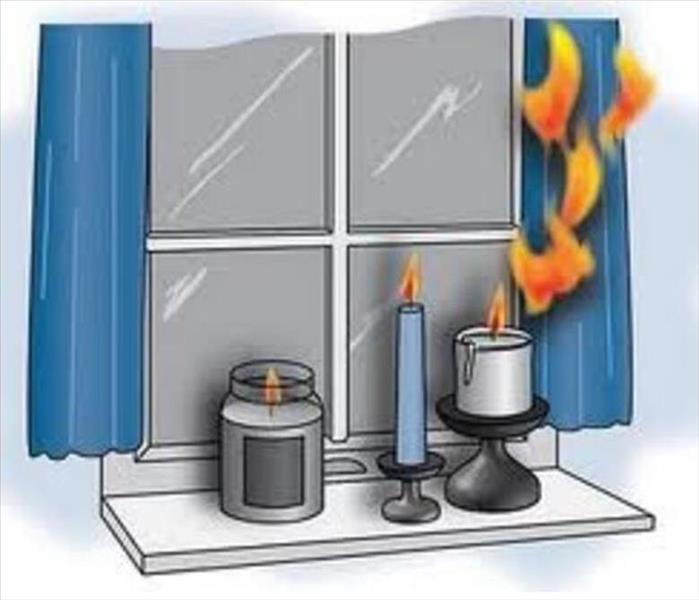 It only takes a second for a candle flame to catch and spread.
It only takes a second for a candle flame to catch and spread.
How to Avoid Fire Damage from Candles
There’s nothing like watching the flickering flames of a candle as they dance around a dark room, or just provide an extra flair of light along with the fragrance that scented candles emit. Just think about having a candle lit on the table next to you as you curl up in a chair to read a book on a snowy night.
While candles are beautiful, they can also be dangerous. From 2014 to 2018, the National Fire Protection Association noted that there were an average of 7,610 home fires that were started by candles each year, resulting in $278 million in fire damage to the properties.
Don’t stop buying candles, though. As long as you use them properly, you can prevent the fire damage that can be caused by candles.
First, never leave a candle unattended. Even if you’re just stepping outside to check the mail, blow out the candle first, because you never know if you’ll wind up chatting with a neighbor for a few minutes. This is especially true if you have pets that are prone to knocking things over. That one trip to the mailbox could result in your cat batting at the candle jar and dropping the flame onto your carpet.
Second, don’t place candles anywhere near dangly items, like window curtains that could waft into the flames in a breeze.
Next, after you light a candle, run the blown out match under water before you throw it into the trash. This way, you’ll avoid any residual sparks from reigniting on the match when it comes in contact with paper or other objects in the trash.
Lastly, always blow out candles before you go to sleep. The thought of sleeping in candlelight may seem lovely, but the potential for fire damage and injury or loss of life is too high to take the risk.
Even if a fire from a candle doesn’t burn down your house or apartment, there can be residual soot and smoke damage from the fire to your furnishings, clothes, and possessions that needs to be remediated. Contact the experts at SERVPRO of Danvers / Ipswich for an assessment and soot, smoke, and fire damage restoration.
Beware of your Dryer!
9/18/2020 (Permalink)
If someone was to ask you what causes a house fire, what would you say? Odds are you would think it would have something to do with a kitchen appliance, a candle, or maybe even lightning, right? Well there’s another danger that is often forgotten about and can have just as catastrophic results. Clothes dryers, if not properly maintained, can pose a serious risk to your home. Here is a brief checklist that you can follow to lessen the risk of a dryer-related disaster in your home.
Always remember:
- Clean the lint tray between every load.
- Do not run the dryer if you are not home.
- Clean the dryer vent duct work yearly.
- Check behind the dryer for dust (and be sure to clean it!)
The Anatomy of Smoke & Fire
9/4/2020 (Permalink)
Smoke and soot are incredibly invasive. They can and will invade all kinds of nooks and crannies within your home, potentially resulting in hidden damage and odor. Our smoke damage expertise and experience allows us to inspect and accurately assess the extent of the damage and help you develop a comprehensive plan of action.
Smoke and soot facts:
- Hot smoke migrates to cooler areas and upper levels of a structure.
- Smoke flows around plumbing systems, seeping through the holes used by pipes to go from floor to floor.
- The type of smoke may greatly affect the restoration process.
Different Types of Smoke
Closely Related but Very Different
There are two different types of smoke– wet and dry. Different types of smoke mean different types of soot residue after a fire. Before restoration can begin, our team will test the soot to determine which type of smoke damage has occurred. The information collected during these pretests determine what cleaning procedures we will follow. Here is some additional information:
Wet Smoke – Plastic and Rubber
- Low heat, smoldering, pungent odor, sticky, smeary. Smoke webs are more difficult to clean.
Dry Smoke – Paper and Wood
- Fast burning, high temperatures, heat rises therefore smoke rises.
Protein Fire Residue – Produced by evaporation of material rather than from a fire
- Virtually invisible, discolors paints and varnishes, extreme pungent odor.
Getting Back to Normal
Our Fire Damage Restoration Services
SERVPRO of Danvers/Ipswich specializes in fire and water damage restoration, which means we have specific training, personnel, and equipment to get your home back to normal quickly. As a locally owned and operated business, SERVPRO of Danvers/Ipswich is close by and ready to help you out of your emergency.
Make a Plan
9/2/2020 (Permalink)
It’s September which means it is once again National Preparedness Month. This week’s theme is Make a Plan. In the spirit of planning ahead, we have a few steps you can take to prepare in case you ever find yourself in a fire.
- Make an exit plan: In the event of a fire, knowing your exit strategy ahead of time is vital. Different rooms in your home or office may require a different plan, so be sure to inform everyone of each different exit strategy.
- Have a defined meeting place: Establishing a meeting place ahead of time eases anxieties of where to go and allows you to more easily account for everyone who was inside and make sure no one is missing.
- Keep valuables somewhere safe: By keeping important files and other valuables in a central, safe location, they can be more easily gathered in a short amount of time. Another option to consider is a fire-proof lock box or safe to store valuables.
After a House Fire
9/2/2020 (Permalink)
Often, the hardest part for residents after a home fire is knowing where to begin and who to contact. These tips taken from FEMA provide information on what to do after experiencing a tragic home fire.
Your Next Steps After a Fire
Here are the steps to follow after a fire in your home:
- Contact your local disaster relief service, such as the American Red Cross. This will help you find a place to stay and to find food, clothing and medicine.
- If you have insurance, contact your insurance company. Ask what you should do to keep your home safe until it is repaired. Ask who you should talk to about cleaning up your home. If you are not insured, try contacting community groups for aid and assistance.
- Check with the fire department before entering your home to ensure it is safe. Be very careful when you go inside, floors and walls may not be as safe as they look.
- The fire department will tell you if your utilities (water, electricity, and gas) are safe to use. If they are deemed to be unsafe, firefighters will have them shut off before they leave. Do not try to turn them back on by yourself as this could be very dangerous.
- Contact your landlord or mortgage company to inform them of the fire.
- If you leave your home, call the local police department to let them know that the site will be vacant.
- Begin saving receipts for any purchases made in relation to the loss. These receipts may be needed later by the insurance company and are needed to prove any losses claimed on your income tax.
- Check with an accountant or the IRS regarding special benefits for people recovering from a fire loss.
Stay Safe While Grilling
8/11/2020 (Permalink)
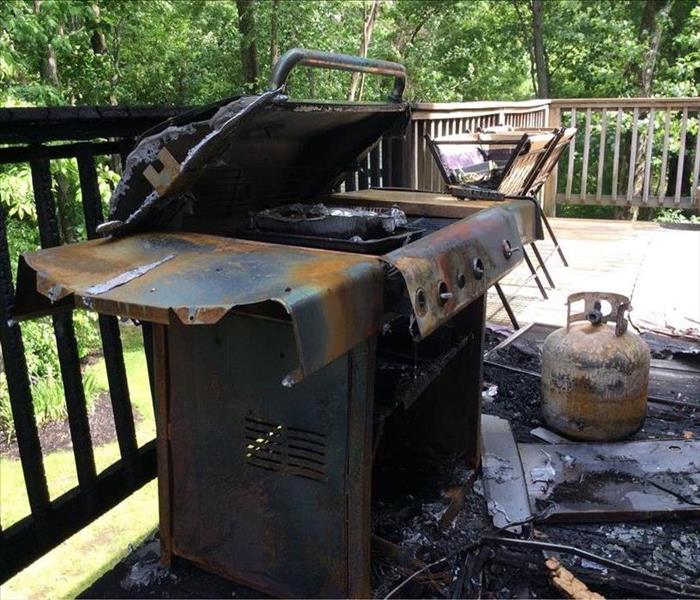 This grill caught fire and left half of a house and the deck it was placed on utterly destroyed.
This grill caught fire and left half of a house and the deck it was placed on utterly destroyed.
Grilling season is back in full swing and so are grill-related disasters. No matter your level of experience, it is important to remember that no one is immune from grill fires. There are, however, some steps you can take to help minimize your chances of ending up in a bad situation.
- Keep your grill away from the house- This means keeping it off of the deck as well. The general rule is to keep the grill at least 10 feet from a standing structure.
- Be careful of grass- Grass, especially if it’s dead, can pose a significant fire hazard. If ashes fly out of a grill and land on the grass, the grass could catch and cause serious damage.
- Pay attention- Don’t leave your grill unattended for extended periods of time. Fires can start in the blink of an eye, so be sure to supervise anytime your grill is on.
Remember to use common sense when using a grill and if you are unsure of something, look it up. Stay safe and enjoy the rest of the summer!
Space Heater Safety Tips
2/13/2020 (Permalink)
During the cold New England winters, many homeowners use space heaters to help heat their homes. But space heaters can also cause deadly fires if left unattended or used improperly. To help keep your family safe, follow the mass.gov safety tips listed below.
Using space heaters safely
- Keep space heaters 3 feet away from drapes, furniture or other things that can burn.
- Put heaters on a level surface away from places where someone might bump into it and knock it over.
- Avoid using extension cords. If you must use an extension cord, use a heavy duty one marked with a power rating at least as high as that of the heater itself.
- Never leave a space heater unattended.
- Never leave a space heater on while you sleep.
- Supervise children and pets near space heaters.
- Buy heaters that are tested and labeled by a nationally recognized testing company, such as Underwriter’s Laboratories Inc.(UL).
- Keep electric heaters away from water. Never use them near a sink or in the bathroom.
- Never use an unvented kerosene heater. It is illegal to sell or use them in Massachusetts.
Every Second Counts
1/27/2020 (Permalink)
Most people think of escape plans and prevention when they think about fire safety but there is a much neglected and overlooked resource to consider.
The Forgotten Red-Head!
Prevention and a plan are obviously high priority, but when is the last time you thought about that fire hydrant up the street from your home or business? Keeping it clear of snow can save valuable time when time is of the essence.
If you have thought of it, but your thoughts go something like "It's not my responsibility to clear it of snow" you should reconsider.
Saving Valuable Seconds
Depending on the city or town you live in, keeping the hydrant clear of snow and debris could quite possibly be your responsibility. Check with your local fire department or town hall to find out the laws in your area.
Beyond that, keeping it clear only benefits you. If you are the victim of a fire, what do you want the firemen spending their time on? Clearing the hydrant or fighting the fire? Be smart. Be a good neighbor. Do what's Right.
After A Fire
If you are the unfortunate victim of a fire, we're here to help. After the fire trucks leave, your home likely suffers from fire and smoke damage and extensive water damage from firefighting efforts. SERVPRO of Danvers/Ipswich has the specialized fire restoration training needed to restore your home to pre-fire conditions.
Have Questions About Fire, Smoke, or Soot Damage? Call Today – 978-356-7077
Cooking Safety Tips
1/17/2020 (Permalink)
Cooking Fire Preparedness
Cooking fires are the number one cause of home fires and home fire injuries. Home fires are more likely to start in the kitchen than any other room in your house. Here are some facts and tips from mass.gov to help prevent kitchen fires.
Cooking fires are the #1 cause of home fires and home fire injuries according to MFIRS statistics.
Cooking Safety Tips
- Put a lid on a grease fire to smother it, then turn off the heat. Baking soda will also work.
- Never move a burning pan. You can be badly burned or spread the fire.
- Never throw water or use a fire extinguisher on a grease fire. Water will only spread the fire and the force of the extinguisher can splash flaming grease out of the pan.
- Stand by your pan. Don’t leave food, grease or oils cooking on the stovetop unattended.
- Wear short or tight fitting sleeves when cooking. Loose fitting clothing can easily catch fire.
- If your clothing catches fire, STOP, DROP & ROLL to put out the flames. Put burns in cool running water. Call 9-1-1 for help.
- Keep pot handles turned inward to prevent accidental spills of hot contents.
- Keep combustible objects such as pot holders, towels, paper or plastic bags away from heating elements.
- For fires inside an oven or microwave, keep the door closed, turn off the appliance, and call the fire department.
- Don’t place any metal inside a microwave. Utensils, aluminum foil or twist-tie wraps can arc and cause a fire.
- Microwaved foods and liquids can become very hot. Use caution to avoid scalds.
- Unplug appliances, such as toasters and coffee makers, when not in use.
- Don’t use the oven to store items.
Following these tips will help you to prevent kitchen fires. However, should your home experience an unexpected disaster, contact us at SERVPRO of Danvers/Ipwich 978-356-7077. We’re here to help restore your property, "Like it never even happened."
Smoke and Fire Facts
9/30/2019 (Permalink)
Did you know there are about 355,400 house fires a year causing a lot of smoke and soot. Smoke and soot are invasive and can penetrate various cavities within your home, causing hidden damage and odor. Our smoke damage expertise and experience allows us to inspect and accurately assess the extent of the damage to develop a comprehensive plan of action.
Smoke and soot facts:
- Hot smoke migrates to cooler areas and upper levels of a structure.
- Smoke flows around plumbing systems, seeping through the holes used by pipes to go from floor to floor.
- The type of smoke may greatly affect the restoration process.
Two Different Types Of Smoke
There are two different types of smoke–wet and dry. As a result, there are different types of soot residue after a fire. Before restoration begins, we will test the soot to determine which type of smoke damage occurred. The cleaning procedures will then be based on the information identified during pretesting. Here is some additional information:
Wet Smoke – Plastic and Rubber
- Low heat, smoldering, pungent odor, sticky, smeary. Smoke webs are more difficult to clean.
Dry Smoke – Paper and Wood
- Fast burning, high temperatures, heat rises therefore smoke rises.
Protein Fire Residue – Produced by evaporation of material rather than from a fire
- Virtually invisible, discolors paints and varnishes, extreme pungent odor.
Who Should You Call?
Our Fire Damage Restoration Services
SERVPRO of Danvers/Ipswich specializes in fire and water damage restoration. We have the specific damage restoration training, personnel, and equipment and can quickly restore your home to pre-fire condition. Moreover, We live and work in this community too; we might even be neighbors. As a locally owned and operated business, SERVPRO of Danvers/Ipswich is close by and ready to respond to your smoke or fire damage emergency.
Clothes Dryer Fire Safety Outreach Material
9/3/2019 (Permalink)
Growing up comes with responsibility, doing your own laundry is one of them. Did your parents ever tell you to clean the lint filter before every use? Well if they did, here is why. 2,900 home clothes dryer fires are reported each year and in some cases are fatal. Failure to clean the dryer is the leading cause of dryer fires and they mostly occur in the fall and winter months. Here are some do’s and don’ts when it comes to clothes dryers.
Do’s
- Have your clothes dryer installed by a professional.
- Clean the lint out of the vent pipe every three months.
- Put a cover on the outside wall dampers to keep out snow, dirt, and rain.
- Make sure the outdoor vent covering opens when the dryer is on.
- Keep the area around the dryer free of items that can burn.
Don’ts
- Do not use a clothes dryer without a lint filter.
- Do not put too many clothes in the dryer at once.
- Do not dry anything containing foam, rubber or plastic.
- Do not dry items that have come into contact with anything flammable.
- Do not leave a clothes dryer running if you leave the house.
5 Most Common Causes Of A House Fire
8/13/2019 (Permalink)
To the hot summer days, to the cold frigged winters, house fires can be started quickly and spread fast. A house can easily catch fire from the misuse of heating equipment, appliances and even smoking in your bedroom. In fact, house fires are the leading cause of all fire deaths in the United States.
Here are 5 of the most common causes of a house fire and some prevention tips.
- Cooking equipment. Pots, pans, and burning food can easily overheat and catch fire if the person is not paying attention. Stay in the room, or ask someone to watch your food while you are away from the kitchen.
- Heating. Portable heaters are used a lot during the winter months. Keep portable heaters at least 1 meter away from furniture, laundry, curtains, clothes and anything else that may be a hazard. If you have a furnace, make sure it is inspected once a year.
- Smoking in bedrooms. Fires started in the bedroom makeup 73% of all house fire fatalities! Bedrooms should be kept off-limits from smoking. Cigarette flames may stay alit for several hours before dying out. It could easily catch fire if it came in contact with flammable materials.
- Electrical Equipment. Electrical appliances like toasters, microwaves, and skillets should always be double-checked before using. Overloaded adapter plugs can also cause a fire from overuse of electricity. Don’t plug too much in at once.
- Candles. Who doesn’t love a good smelling candle? If left unattended it could cause your hose to go up in flames! Keep them away from items like tissue boxes, books, and napkins. And of course, always blow them out before leaving a room.
Fireplace Safety Tips
3/2/2019 (Permalink)
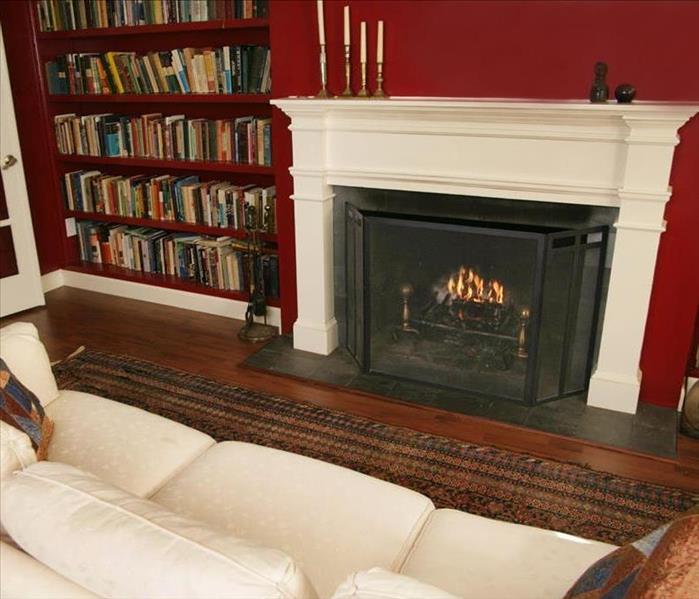 Keep your fireplaces beautiful and cozy with these safety tips. Image via USFA.FEMA.gov
Keep your fireplaces beautiful and cozy with these safety tips. Image via USFA.FEMA.gov
During the chilly winter months in New England, many Topsfield residents keep warm in front of a cozy fire. Whether you have a gas, wood, or electric fireplace, it’s important to follow a few safety guidelines to ensure that you are keeping your family safe from potential fire hazards.
Wood and Gas Fireplaces
Get an annual fireplace and chimney inspection from a trusted professional to make sure your fireplace and chimney are in good working condition. Be sure that the chimney flue is open before the fire is lit. An open flue will allow the air to feed the flames and allow the smoke to exit. And like any other source of fire, keep your children and pets away from the flames.
Electric Fireplaces
Many homes have an electric fireplace and although the flame isn’t real, safety precautions still need to be taken. Your electric fireplace is essentially a portable electric heater, and should be treated as such. Be sure that your heat source has enough space around it for the air to flow, and that it isn’t close to curtains or other materials that could potentially burn. Keep your electric fireplace away from any water sources, it should never be used near a washing machine, sink, or other source of water. Lastly, power strips and extension cords are not recommended; plug your fireplace directly in a wall unit.
Space Heater Safety Tips
2/18/2019 (Permalink)
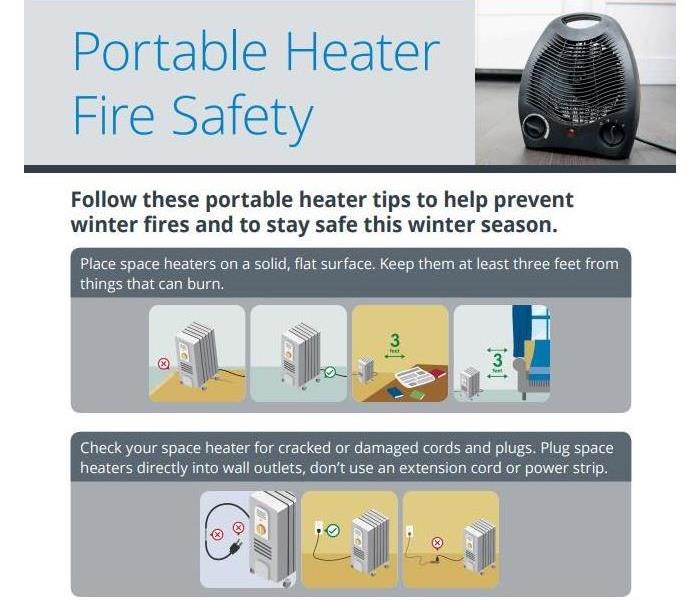 Keep your family safe with these space heater safety tips provided courtesy of FEMA.gov.
Keep your family safe with these space heater safety tips provided courtesy of FEMA.gov.
During the cold New England winters, many homeowners use space heaters to help heat their homes. But space heaters can also cause deadly fires if left unattended or used improperly. To help keep your family safe, follow the mass.gov safety tips listed below.
Using Space Heaters Safely
- Keep space heaters 3 feet away from drapes, furniture or other things that can burn.
- Put heaters on a level surface away from places where someone might bump into it and knock it over.
- Avoid using extension cords. If you must use an extension cord, use a heavy duty one marked with a power rating at least as high as that of the heater itself.
- Never leave a space heater unattended.
- Never leave a space heater on while you sleep.
- Supervise children and pets near space heaters.
- Buy heaters that are tested and labeled by a nationally recognized testing company, such as Underwriter’s Laboratories Inc.(UL).
- Keep electric heaters away from water. Never use them near a sink or in the bathroom.
- Never use an unvented kerosene heater. It is illegal to sell or use them in Massachusetts.
Church Fire Causes Smoke Damage
2/4/2019 (Permalink)
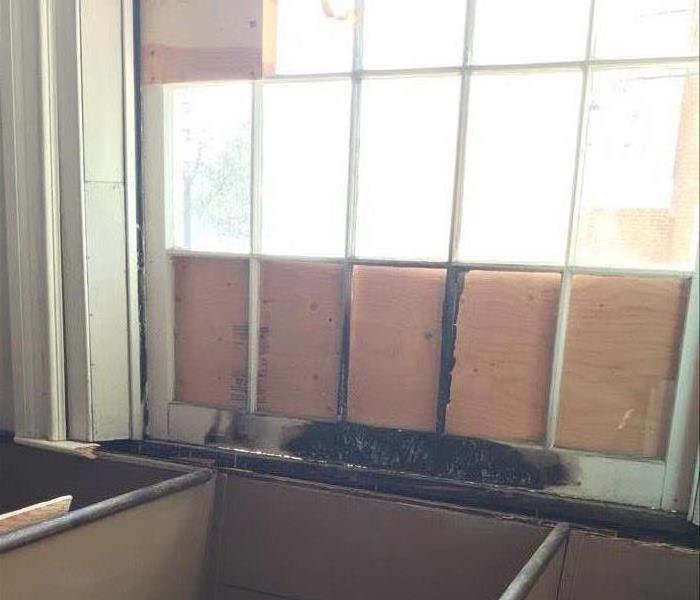 Fire and soot damage caused by a candle that reignited in the windowsill.
Fire and soot damage caused by a candle that reignited in the windowsill.
Recently, a local church experienced fire damage and called in SERVPRO of Danvers/Ipswich to help. The fire started from a candle burning in the windowsill which spread to a cavity in between the walls. Luckily, a neighbor saw the fire inside of the church and promptly called the fire department. The first responders were quick to arrive, extinguishing the fire and preventing it from spreading throughout the building. Despite their timely response, unfortunately, there was quite a lot of damage to the window and carpet below. Smoke filled the church, resulting in black soot covering the surfaces throughout, including the pews, walls, ceiling, and balcony area.
We began the process by wiping the top layer of contaminants away. Then, using SERVPRO’s time-tested and industry-approved steps, along with our proprietary cleaning products and methods, we restored the walls and surfaces without the need to repaint or refinish. The cleaning process removed the smell from the fire, returning it to pre-fire condition. We have the training and equipment to identify and eliminate these offensive odors. By identifying the cause of the odor and determining the conditions in which the damage was done, the odor can often be removed over time without a trace. Our technicians have access to several odor removal products capable of penetrating surfaces to neutralize an unpleasant odor thoroughly.
SERVPRO Goes to Danvers Fire Open House!
10/31/2018 (Permalink)
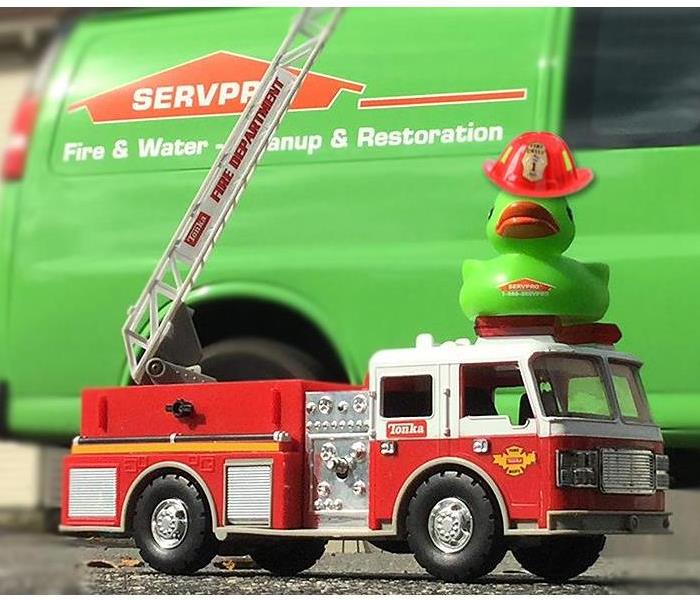 Our SERVPRO duck, Figuero came with us to Danvers Fire's Open House! Isn't he so cute on his little truck?!
Our SERVPRO duck, Figuero came with us to Danvers Fire's Open House! Isn't he so cute on his little truck?!
Fire Prevention Month
October is Fire Prevention Month and every year, local fire departments host an open house to educate the community about fire safety. It’s a great family event to meet the firefighters and see them demonstrate best safety practices. The smoke house demonstration was a favorite of the children, where they got to walk through a fire and smoke simulation, learning to crawl under the smoke to safety. The firefighters also had a jaws of life demonstration that was really amazing to watch!
SERVPRO of Danvers/Ipswich is always happy to be part of this great event and support our local fire departments. We appreciate the brave men and women that serve our community and help keep us safe. Papa Gino’s generously donated pizza for this event, and we donated lollipops, water and apples from Connor’s Farm. We also gave out cute little SERVPRO rubber ducks to the children (and some adults too!)
SERVPRO of Danvers/Ipswich specializes in fire and water damage restoration. We have the specific damage restoration training, personnel, and equipment and can quickly restore your home to pre-fire condition.
What To Do After a Home Fire
9/17/2018 (Permalink)
Our hearts go out to the victims of the Merrimack Valley gas fires that struck the towns of Lawrence, Andover and North Andover last Thursday. Often, the hardest part for residents after a home fire is knowing where to begin and who to contact. These tips taken from FEMA provide information on what to do after experiencing a tragic home fire.
Checklist for Next Steps After a Fire
Here are the steps to follow after a fire in your home:
- Contact your local disaster relief service, such as the American Red Cross. This will help you find a place to stay and to find food, clothing and medicine.
- If you have insurance, contact your insurance company. Ask what you should do to keep your home safe until it is repaired. Ask who you should talk to about cleaning up your home. If you are not insured, try contacting community groups for aid and assistance.
- Check with the fire department to make sure that your home is safe to enter. Be very careful when you go inside. Floors and walls may not be as safe as they look.
- The fire department will tell you if your utilities (water, electricity and gas) are safe to use. If not, firefighters will have your utilities shut off before they leave. Do not try to turn them back on by yourself. This could be very dangerous.
- Contact your landlord or mortgage company about the fire.
- If you leave your home, call the local police department to let the police know that the site will be vacant.
- Begin saving receipts for any money that you spend related to fire loss. The receipts may be needed later by the insurance company and to prove any losses claimed on your income tax.
- Check with an accountant or the IRS about special benefits for people recovering from fire loss.
Preventing Cooking Fires
9/10/2018 (Permalink)
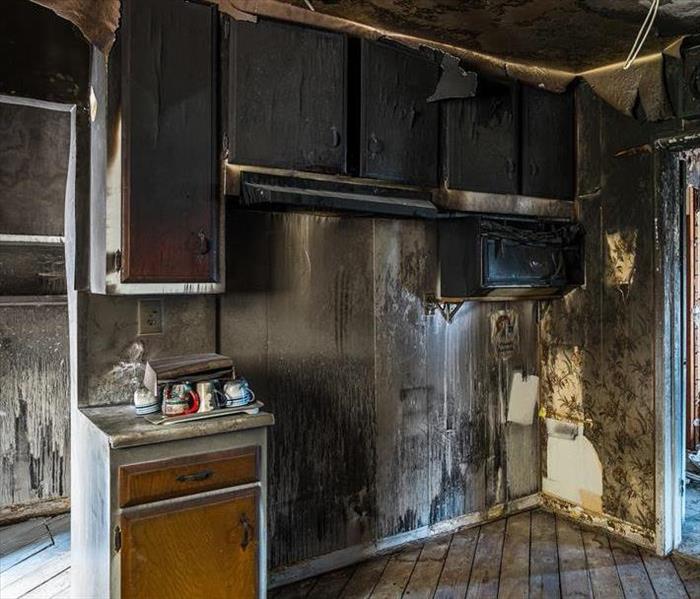 Kitchen fires can be devastating. Prevent cooking fires by following some simple safety tips. Image via Shutterstock.com (copyright free)
Kitchen fires can be devastating. Prevent cooking fires by following some simple safety tips. Image via Shutterstock.com (copyright free)
Cooking Fire Preparedness
Cooking fires are the number one cause of home fires and home fire injuries. Home fires are more likely to start in the kitchen than any other room in your house. Here are some facts and tips from mass.gov to help prevent kitchen fires.
Cooking fires are the #1 cause of home fires and home fire injuries according to MFIRS statistics.
Cooking Safety Tips
- Put a lid on a grease fire to smother it, then turn off the heat. Baking soda will also work.
- Never move a burning pan. You can be badly burned or spread the fire.
- Never throw water or use a fire extinguisher on a grease fire. Water will only spread the fire and the force of the extinguisher can splash flaming grease out of the pan.
- Stand by your pan. Don’t leave food, grease or oils cooking on the stovetop unattended.
- Wear short or tight fitting sleeves when cooking. Loose fitting clothing can easily catch fire.
- If your clothing catches fire, STOP, DROP & ROLL to put out the flames. Put burns in cool running water. Call 9-1-1 for help.
- Keep pot handles turned inward to prevent accidental spills of hot contents. • Create a three-foot “child-free zone” around the stove. Keep children and pets away from the stove while cooking to prevent burns and scalds. Cooking Safety Tips (cont.)
- Keep combustible objects such as pot holders, towels, paper or plastic bags away from heating elements.
- For fires inside an oven or microwave, keep the door closed, turn off the appliance, and call the fire department.
- Don’t place any metal inside a microwave. Utensils, aluminum foil or twist-tie wraps can arc and cause a fire.
- Microwaved foods and liquids can become very hot. Use caution to avoid scalds.
- Unplug appliances, such as toasters and coffee makers, when not in use.
- Don’t use the oven to store items.
Following these tips will help you to prevent kitchen fires. However, should your home experience an unexpected disaster, contact us at SERVPRO of Danvers/Ipswich at 978-356-7077. We’re here to help restore your property, like it never even happened.
When Every Second Counts…
3/7/2018 (Permalink)
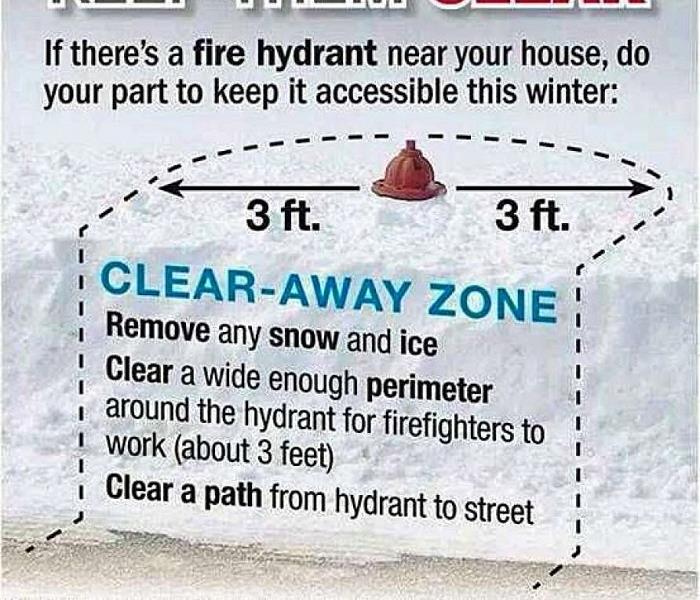 Graphic showing snow clearing around fire hydrant. Image via www.woburnma.gov
Graphic showing snow clearing around fire hydrant. Image via www.woburnma.gov
The National Fire Protection Association's theme for 2017 was "Every Second Counts" and when you think about that statement, it couldn't be more true. Most people think of escape plans and prevention when they think about fire safety but there is a much neglected and overlooked resource to consider.
The Forgotten Red-Head!
Prevention and a plan are obviously high priority, but when is the last time you thought about that fire hydrant up the street from your home or business? Keeping it clear of snow can save valuable time when time is of the essence.
If you have thought of it, but your thoughts go something like "It's not my responsibility to clear it of snow" you should reconsider.
Saving Valuable Seconds
Depending on the city or town you live in, keeping the hydrant clear of snow and debris could quite possibly be your responsibility. Check with your local fire department or town hall to find out the laws in your area.
Beyond that, keeping it clear only benefits you. If you are the victim of a fire, what do you want the firemen spending their time on? Clearing the hydrant or fighting the fire? Be smart. Be a good neighbor. Do what's Right.
After A Fire
If you are the unfortunate victim of a fire, we're here to help. After the fire trucks leave, your home likely suffers from fire and smoke damage and extensive water damage from firefighting efforts. SERVPRO of Danvers/Ipswich have the specialized fire restoration training needed to restore your home to pre-fire condition.
Have Questions About Fire, Smoke, or Soot Damage? Call Today – (978) 777-3498
The Anatomy of Smoke & Fire Damage
3/7/2018 (Permalink)
Smoke and soot are invasive and can penetrate various cavities within your home, causing hidden damage and odor. Our smoke damage expertise and experience allows us to inspect and accurately assess the extent of the damage to develop a comprehensive plan of action.
Smoke and soot facts:
- Hot smoke migrates to cooler areas and upper levels of a structure.
- Smoke flows around plumbing systems, seeping through the holes used by pipes to go from floor to floor.
- The type of smoke may greatly affect the restoration process.
Different Types of Smoke
Closely Related But Very Different
There are two different types of smoke–wet and dry. As a result, there are different types of soot residue after a fire. Before restoration begins, we will test the soot to determine which type of smoke damage occurred. The cleaning procedures will then be based on the information identified during pretesting. Here is some additional information:
Wet Smoke – Plastic and Rubber
- Low heat, smoldering, pungent odor, sticky, smeary. Smoke webs are more difficult to clean.
Dry Smoke – Paper and Wood
- Fast burning, high temperatures, heat rises therefore smoke rises.
Protein Fire Residue – Produced by evaporation of material rather than from a fire
- Virtually invisible, discolors paints and varnishes, extreme pungent odor.
Getting Back to Normal
Our Fire Damage Restoration Services
SERVPRO of Danvers/Ipswich specializes in fire and water damage restoration. We have the specific damage restoration training, personnel, and equipment and can quickly restore your home to pre-fire condition. Moreover, we live and work in this community too; we might even be neighbors. As a locally owned and operated business, SERVPRO of Danvers/Ipswich is close by and ready to respond to your smoke or fire damage emergency.
Space Heaters Need Their Space
2/7/2018 (Permalink)
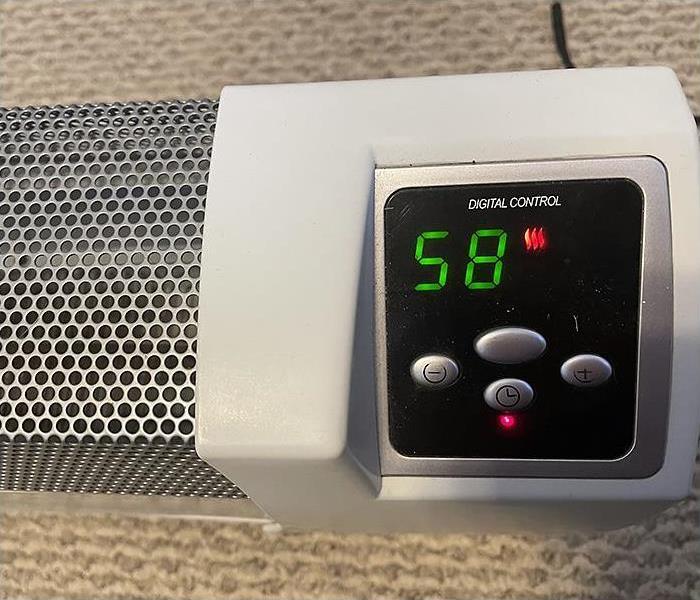 Image via Jodi Feil (copyright free)
Image via Jodi Feil (copyright free)
During the winters months, many people have the mind set that keeping the overall home or office temperature lower while adding space heaters will save money. Whether that makes fiscal sense depends on several variables. The one thing that does not vary though, is that space heaters, when not used properly can be dangerous.
Space heaters should be kept at a minimum distance of three feet but often are used near beds or under desks, altogether too close to fabrics, papers or other flammable materials. Not considering this hazard can lead to unexpected fires that spread quickly.
Keeping these tips from DIY Network in mind can avoid potential tragedies:
No matter what type or brand of space heater you opt to use, follow these safety tips from the NFPA to reduce the chances of fires and injury:
- Keep anything that can burn, including bedding, furniture, and curtains at least 3 feet away from a space heater.
- Have a three-foot "kid-free zone" around space heaters and never use a space heater in a child's bedroom.
- Run power cords on top of carpet and step over them to avoid abrading the cord. Do not use extension cords.
- Turn off space heaters when going to bed or leaving a room.
- Don't use a space heater in a damp or wet area unless it's specifically made for that purpose.
- Turn space heaters off before leaving the room or going to bed.
- Never put a space heater on a countertop unless it's specifically designed for it.
- Install smoke and carbon monoxide alarms and test monthly.
- Only purchase "UL Listed" heaters which display the UL mark on their label. This is an independent organization which tests for safety.
- Don't use gas- or oil-burning space heaters indoors, only outdoors or in spaces open to the outdoors like tents or porches.
- Read and follow all manufacturer's directions for your space heater.
We are always here to help. Although we are in the clean-up business, we would rather see you avoid the crisis. In the event you do need fire-damage restoration, we will treat your home as if it's our own.
Deep Fried Disaster!
11/3/2017 (Permalink)
Although a mighty delicious tradition, deep-frying a turkey on Thanksgiving can be risky.
Every year deep-fryer fires are responsible for five deaths, 60 injuries, the destruction of 900 homes, and more than $15-million in property damage, according to the National Fire Protection Association.
So you want to know which state has the most accidents?
For the last seven years, Texas has led the country in most grease- and cooking-related insurance claims on Thanksgiving Day, with 38 according to insurance company State Farm. Illinois follows, with 27 reports and Pennsylvania and Ohio are tied for third with 23. New York ranked fourth, with 22 claims and South Carolina and Georgia claimed fifth with 16 claims each.
Check out State Farm's safety video starring Si and Jase Robertson from "Duck Dynasty" fame. They give helpful and hilarious tips on how to avoid those nasty shooting flames.
https://youtu.be/ZNPNayJDxIo
SERVPRO Supports Georgetown
9/22/2017 (Permalink)
 A donation of apples –and wise advice– at Georgetown Fire Open House.
A donation of apples –and wise advice– at Georgetown Fire Open House.
October is fire safety month. Most fire departments open their doors to the public, welcoming the community in to learn about fire safety, see the cool equipment they use, demonstrate best safety practices and even let the kids climb in and on the trucks. It's just a great family day, all around, to meet the men and women that dedicate their lives to keeping our communities safe.
SERVPRO is always happy to support our local Fire Departments. At the most recent Open House for Georgetown Fire, we donated apples (and some wise advise)!
SERVPRO of Danvers/Ipswich specializes in fire and water damage restoration. We have the specific damage restoration training, personnel, and equipment and can quickly restore your home to pre-fire condition.
Every Second Counts! Fire Prevention Month
9/22/2017 (Permalink)
 A downloadable graphic to review with family and co-workers.
A downloadable graphic to review with family and co-workers.
October is Fire Safety Month
While it is our job to clean up after the Fire Dept has contained the fire, SERVPRO of Haverhill/Newburyport and SERVPRO of participates in many of the local Fire Department Open Houses during this very important month.
The theme this year is "Every Second Counts" and it couldn't be more true. You can get a head start on fire prevention month by downloading this graphic. This downloadable graphic is a great learning tool to use with your family or in the workplace. They will be on hand for you to take with you and most fire houses.
Print it out and hang it in an area that gets a lot of traffic. A break room or your refrigerator, for instance. Having it in a visible place will keep it "top of mind" in the event it's needed.






 24/7 Emergency Service
24/7 Emergency Service













